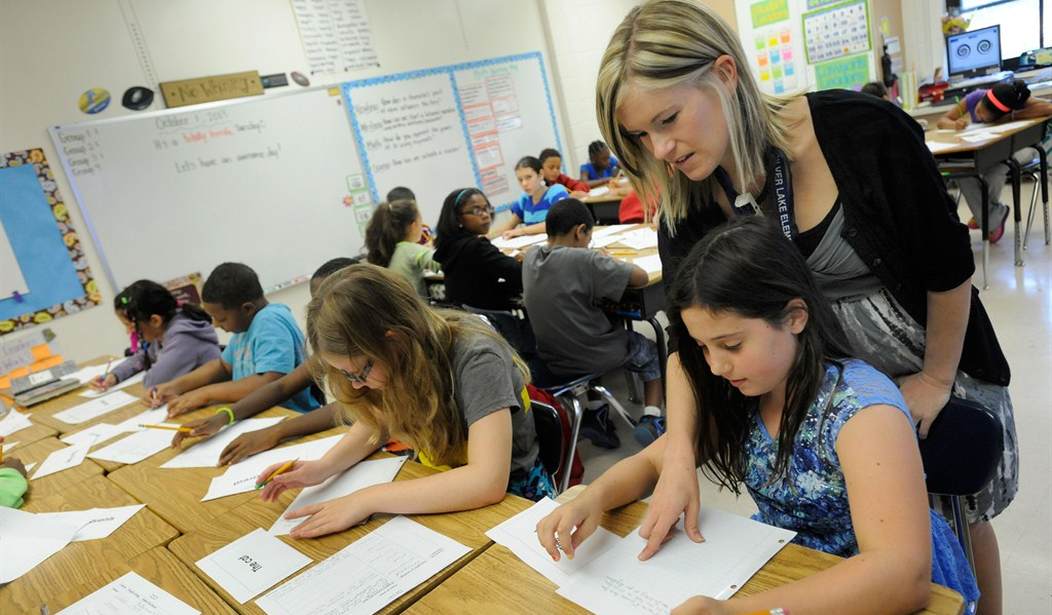Given our still-sputtering economy, Americans have grown used to their public schools facing tight budgets. This fiscal squeeze has drawn out a hidden crisis in public education: How do we keep our best teachers in the classroom?
The short answer is, we don't.
Between 2009 and 2012, public schools laid off about 140,000 teachers across America. In most places, teachers are let go in order of seniority, based solely on how long they've been in the system.
According to the National Council on Teacher Quality, only 15 states require teacher performance to inform decisions about layoffs. But, as parents and school administrators realized they were losing their most effective young teachers, fights erupted from California to Connecticut.
Most recently, the battle has come to Philadelphia, America's eighth-largest school district. There, the Philadelphia Federation of Teachers is in a tense standoff over the rehiring of 3,800 laid-off teachers and other school employees.
In the midst of a longstanding budget crisis, Philadelphia school district officials can't rehire every teacher. Their solution? Suspend seniority rules and put the best teachers back in the classroom. Naturally, the teachers' union is fighting them tooth and nail.
As in other cities, seniority is harming Philadelphia's parents, teachers, and some of its most disadvantaged students. For Philadelphia Rep. Vanessa Brown, chairwoman of the Pennsylvania's black caucus, seniority rules were nearly a matter of life and death.
Learning was always a struggle for Brown's special needs son-until the second grade. Then one day he told his surprised mother that he loved school. The reason was a dynamic new teacher, who connected so well with her son, the boy moved up three grades in just one year.
By the time Brown's son reached ninth grade, however, a massive teacher layoff in Philadelphia cost the teacher his job. He got "bumped" by a more senior teacher, according to teacher union rules and state law. His excellent results with students like Brown's son didn't matter.
The more senior teacher, according to Brown, interpreted her son's every learning obstacle as a disciplinary problem. The boy grew frustrated, and started acting out. He missed an opportunity to go to college, and that was the beginning of a "long, dark" depression, Brown says.
Were it not for Brown's vigilance, thoughts of suicide might have overwhelmed him. Now Brown remains the only Democratic co-sponsor of a bill that would retain teachers based on performance, not on how much time they've served.
Seniority rules hurt some of the worst-off schools even within failing school districts like Philadelphia. Urban schools tend to attract young zealous teachers. But when layoffs hit, those teachers are the first let go.
In Los Angeles, Markham Middle School-one of the lowest-performing schools in the state-was on track for reform under a new operator and new teachers.
When the Los Angeles Unified School District laid off 9,000 employees in 2009-a tenth of the workforce-Markham lost half of its mostly young staff. Even when re-hiring began, the school was required to hire from a pool of displaced senior teachers first, most of whom didn't even want to teach at Markham. The school ended up having to rely on substitute teachers, derailing its reform efforts.
The National Education Association and American Federation of Teachers have staunchly opposed seniority reform, even when it's meant jettisoning their younger, due-paying members.
That's why detailed teacher evaluation systems, such as those enacted in Florida or Indiana, are important. Used well, and with the goal of providing detailed feedback so teachers know how to improve, such systems tie teacher retention to student performance.
The battle playing out in Philadelphia-and which has been repeated across the country-has real victims. Both teachers and some of our most vulnerable students suffer when we rely on seniority alone to decide who gets to stay in the classroom. But if our public school system is to thrive, we must fight to keep our best teachers teaching.
Keeping Teachers in the Classroom
The opinions expressed by columnists are their own and do not necessarily represent the views of Townhall.com.

Advertisement
Recommended
Trending on Townhall Videos
Advertisement
Advertisement
Advertisement
























Join the conversation as a VIP Member